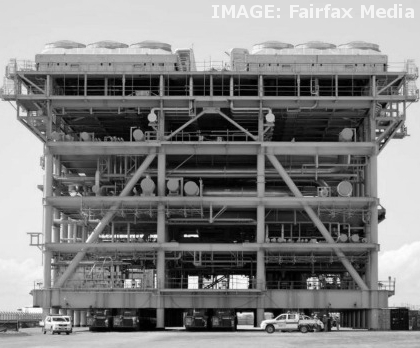Gorgon backers under ATO's lens
 The Australian Taxation Office is looking at the funding of the massive Gorgon natural gas project, amid claims that it will make billions of dollars tax-free.
The Australian Taxation Office is looking at the funding of the massive Gorgon natural gas project, amid claims that it will make billions of dollars tax-free.
Gorgon is expected to deliver tax-free profits of over $60 billion to Chevron, ExxonMobil and Shell over the project’s life, but it appears that the energy giants are not keen to pay their share.
Reports say big three book about $3 billion in profits a year tax free, by charging massive interest rates on related-party loans at their Australian outlets.
In some cases they paid over 10 times the interest rate that they would have paid to third-party lenders in the United States, in a practice some say allows them to rack u huge internal costs in order to minimise the tax they pay.
The Senate inquiry into corporate tax avoidance – which is expected to release an interim report today – will focus next week on the $AU73 billion Gorgon project.
Inquiry leader Senator Sam Dastyari has hinted that the committee will summon executives from the three Gorgon partners for questioning.
The move comes after Chevron Australia and ExxonMobil Australia revealed their overseas funding arrangements were being reviewed by the ATO.
“Frankly they need to front and answer a lot of questions,” Senator Dastyari told Fairfax media reporters.
“The inter-party loan arrangements don't pass the sniff test and appear to be about minimising tax obligations. This is a worrying development.”
But the proponents say the Gorgon project – which is expected to deliver a 13 per cent annual return on equity over the next 40 years – must go ahead.
“The Gorgon and Wheatstone projects represent over $80 billion of investment. Chevron Australia's share of this investment is the largest investment by a single company in Australia's history,” a spokesperson for Chevron - which has 47.3 per cent of Gorgon - told Fairfax.
In 2014, the three Gorgon partners reportedly paid $3.1 billion of interest overseas, most of which was capitalised to the debt, which continues to rise
Much of the $66 billion that the three borrowed from overseas was drawn both from $US40 billion in cash held by their international outlets, while the rest came from short-term debt, at an averaged
Reports say the three Gorgon partners together appear to have paid just $200 million to $300 million to service their $66 billion debt.
This would have delivered an offshore “profit” of $2.8 billion to $2.9 billion from the Australian interest payments.
“It goes to the nub of the issue of the tax debate,” Michael Croker, head of tax policy for Chartered Accountants Australia and New Zealand said on the weekend.
“If you want the big projects, they come at a cost to the revenue base. On the other hand, we really need the impact of these projects.”
And the money keeps coming, with US short-term interest rates expected to rise over the 40 years of the project, while the Australian margin would remain.
This ensures continuing profits for the Gorgon partners and their parent companies.
Shell has defended itself, saying its complex financial structure is the easiest way to do international business.
“Intra-group funding is undertaken in accordance with the ‘arm's length principle’ set out in local and international tax law, which means the terms and conditions of that funding should mirror those that would be available between independent parties”, a Shell Australia spokesperson said.
“The use of a cross-currency interest rate swap removes the ups and downs of borrowing in USD but paying tax in AUD. Currently, due to the fall in the Australian dollar, if not for the cross-currency interest rate swap, Shell's local business would potentially have significant tax losses on its USD loans.”
ExxonMobil has made no comment.
“As one of the Australia's largest investors, Chevron will pay its fair share of tax and, through the Chevron-led Gorgon and Wheatstone Projects, Australia will continue to enjoy the associated economic benefits over the life of the projects,” a Chevron representative said.







 Print
Print